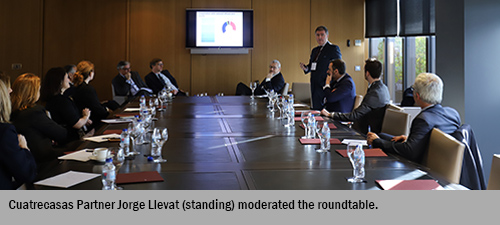Alternative Dispute Resolution Committee: Experts Highlight Need to Raise Awareness of Mediation Method
Published: February 15, 2019
Diana Jennen Cuatrecasas Madrid, Spain
INTA, in collaboration with Cuatrecasas (Spain), held a roundtable on January 24 in Madrid, Spain, on trademark dispute mediation in Europe from the perspective of intellectual property institutions that provide mediation services.
The session, an initiative of the Alternative Dispute Resolution Committee and moderated by Cuatrecasas Partner Jorge Llevat, analyzed European institutions’ mediation experiences and familiarized attendees with mediation proceedings. Moreover, the speakers mainly focused on why mediation is not very popular in Europe and how to bolster its use as an alternative dispute resolution method.
Javier FernÁndez-Lasquetty,

Mediator Théophile Margellos, President of the Boards of Appeal, Head of the Boards of Appeal Mediation Service, European Union Intellectual Property Office (
“We want to analyze the reasons why certain parties do not want to use mediation. Why do parties accept conciliation, proposed by the conciliator, more than mediation, which is a more impartial and confidential process? Can this be explained by a lack of trust and awareness?” Dr. Jur. Margellos said.
Sven Stürmann, a mediator at
The panelists concluded that there is a need to inform both lawyers and the potential parties to a lawsuit about the reliability and effectiveness of mediation as a means of avoiding court procedures.
Although every effort has been made to verify the accuracy of items in the INTA Bulletin, readers are urged to check independently on matters of specific concern or interest.
© 2019 International Trademark Association
This website uses cookies so that we can provide you with the best user experience possible. Cookie information is stored in your browser and performs functions such as recognising you when you return to our website and helping our team to understand which sections of the website you find most interesting and useful.
To find out more please see our Cookies Policy and Privacy Policy.
These cookies are used to identify a user’s browser as the visitor goes from page to page on the Site. These are session cookies, which means that the cookie is deleted when you leave the Site. It is an integral piece of the Site software and used to let the server know which users are on the Site at any given time and make certain parts of the Site easier to use.
|
|
If you disable this cookie, we will not be able to save your preferences. This means that every time you visit this website you will need to enable or disable cookies again.
These cookies are used to collect information about how visitors use our Site. The cookies collect information in anonymous form, including the numbers of visitors to the Site, where visitors have come to the Site from, the pages they visited and how they have interacted with tools on the Site like search and embedded media players. We use the information to compile statistical reports of our users’ browsing patterns so that we can improve the Site.
|
|
Please enable Functionality Cookies first so that we can save your preferences!
These cookies are used to deliver advertising relevant to the interests of visitors to our Site. They are persistent, which means they will remain on your device after you leave the Site.
- Facebook (Ad Pixel)
- Google (Ad Pixel)
- LinkedIn (Ad Pixel)
- Quattro Anonymous
Please enable Functionality Cookies first so that we can save your preferences!
